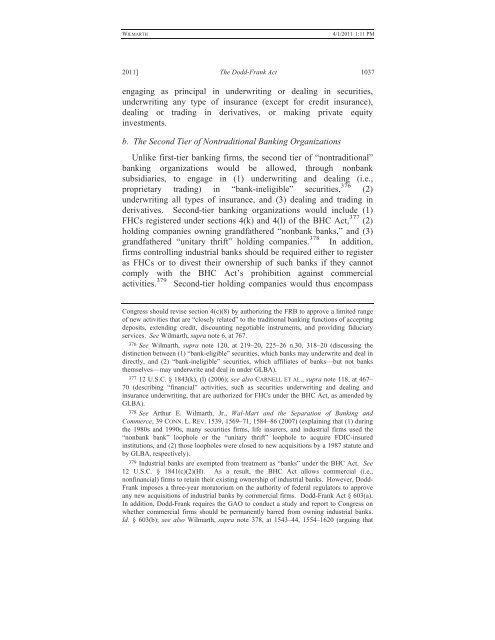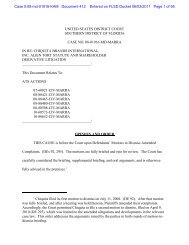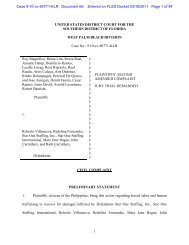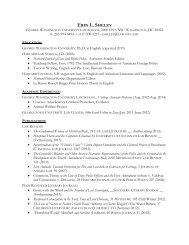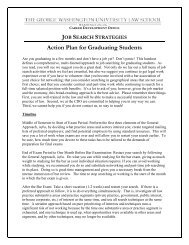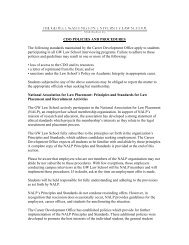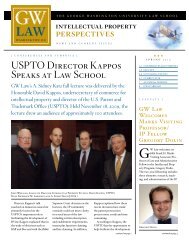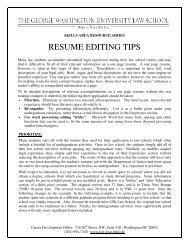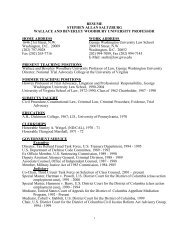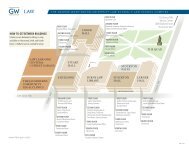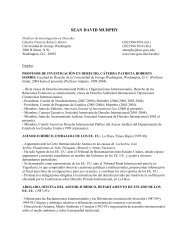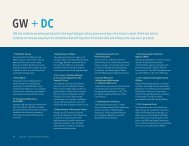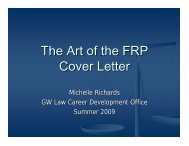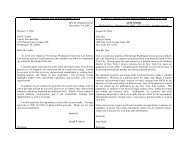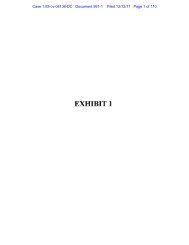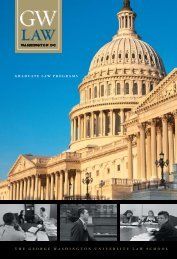CLE Materials for Panel #1 - George Washington University Law ...
CLE Materials for Panel #1 - George Washington University Law ...
CLE Materials for Panel #1 - George Washington University Law ...
You also want an ePaper? Increase the reach of your titles
YUMPU automatically turns print PDFs into web optimized ePapers that Google loves.
WILMARTH<br />
4/1/2011 1:11 PM<br />
2011] The Dodd-Frank Act 1037<br />
engaging as principal in underwriting or dealing in securities,<br />
underwriting any type of insurance (except <strong>for</strong> credit insurance),<br />
dealing or trading in derivatives, or making private equity<br />
investments.<br />
b. The Second Tier of Nontraditional Banking Organizations<br />
Unlike first-tier banking firms, the second tier of “nontraditional”<br />
banking organizations would be allowed, through nonbank<br />
subsidiaries, to engage in (1) underwriting and dealing (i.e.,<br />
proprietary trading) in “bank-ineligible” securities, 376 (2)<br />
underwriting all types of insurance, and (3) dealing and trading in<br />
derivatives. Second-tier banking organizations would include (1)<br />
FHCs registered under sections 4(k) and 4(l) of the BHC Act, 377 (2)<br />
holding companies owning grandfathered “nonbank banks,” and (3)<br />
grandfathered “unitary thrift” holding companies. 378 In addition,<br />
firms controlling industrial banks should be required either to register<br />
as FHCs or to divest their ownership of such banks if they cannot<br />
comply with the BHC Act’s prohibition against commercial<br />
activities. 379 Second-tier holding companies would thus encompass<br />
Congress should revise section 4(c)(8) by authorizing the FRB to approve a limited range<br />
of new activities that are “closely related” to the traditional banking functions of accepting<br />
deposits, extending credit, discounting negotiable instruments, and providing fiduciary<br />
services. See Wilmarth, supra note 6, at 767.<br />
376 See Wilmarth, supra note 120, at 219–20, 225–26 n.30, 318–20 (discussing the<br />
distinction between (1) “bank-eligible” securities, which banks may underwrite and deal in<br />
directly, and (2) “bank-ineligible” securities, which affiliates of banks—but not banks<br />
themselves—may underwrite and deal in under GLBA).<br />
377 12 U.S.C. § 1843(k), (l) (2006); see also CARNELL ET AL., supra note 118, at 467–<br />
70 (describing “financial” activities, such as securities underwriting and dealing and<br />
insurance underwriting, that are authorized <strong>for</strong> FHCs under the BHC Act, as amended by<br />
GLBA).<br />
378 See Arthur E. Wilmarth, Jr., Wal-Mart and the Separation of Banking and<br />
Commerce, 39 CONN.L.REV. 1539, 1569–71, 1584–86 (2007) (explaining that (1) during<br />
the 1980s and 1990s, many securities firms, life insurers, and industrial firms used the<br />
“nonbank bank” loophole or the “unitary thrift” loophole to acquire FDIC-insured<br />
institutions, and (2) those loopholes were closed to new acquisitions by a 1987 statute and<br />
by GLBA, respectively).<br />
379 Industrial banks are exempted from treatment as “banks” under the BHC Act. See<br />
12 U.S.C. § 1841(c)(2)(H). As a result, the BHC Act allows commercial (i.e.,<br />
nonfinancial) firms to retain their existing ownership of industrial banks. However, Dodd-<br />
Frank imposes a three-year moratorium on the authority of federal regulators to approve<br />
any new acquisitions of industrial banks by commercial firms. Dodd-Frank Act § 603(a).<br />
In addition, Dodd-Frank requires the GAO to conduct a study and report to Congress on<br />
whether commercial firms should be permanently barred from owning industrial banks.<br />
Id. § 603(b); see also Wilmarth, supra note 378, at 1543–44, 1554–1620 (arguing that


